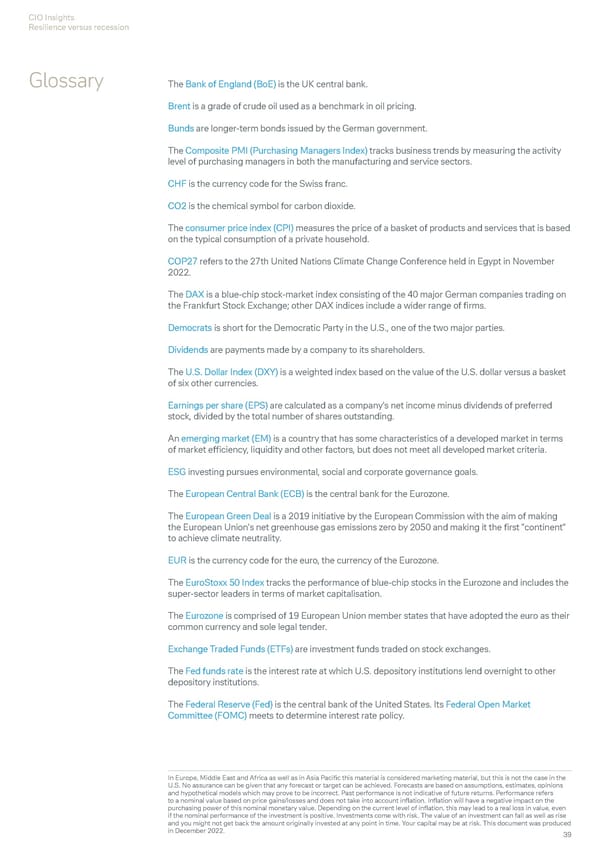CIO Insights Resilience versus recession Glossary The Bank of England (BoE) is the UK central bank. Brent is a grade of crude oil used as a benchmark in oil pricing. Bunds are longer-term bonds issued by the German government. The Composite PMI (Purchasing Managers Index) tracks business trends by measuring the activity level of purchasing managers in both the manufacturing and service sectors. CHF is the currency code for the Swiss franc. CO2 is the chemical symbol for carbon dioxide. The consumer price index (CPI) measures the price of a basket of products and services that is based on the typical consumption of a private household. COP27 refers to the 27th United Nations Climate Change Conference held in Egypt in November 2022. The DAX is a blue-chip stock-market index consisting of the 40 major German companies trading on the Frankfurt Stock Exchange; other DAX indices include a wider range of firms. Democrats is short for the Democratic Party in the U.S., one of the two major parties. Dividends are payments made by a company to its shareholders. The U.S. Dollar Index (DXY) is a weighted index based on the value of the U.S. dollar versus a basket of six other currencies. Earnings per share (EPS) are calculated as a company's net income minus dividends of preferred stock, divided by the total number of shares outstanding. An emerging market (EM) is a country that has some characteristics of a developed market in terms of market efficiency, liquidity and other factors, but does not meet all developed market criteria. ESG investing pursues environmental, social and corporate governance goals. The European Central Bank (ECB) is the central bank for the Eurozone. The European Green Deal is a 2019 initiative by the European Commission with the aim of making the European Union's net greenhouse gas emissions zero by 2050 and making it the first "continent" to achieve climate neutrality. EUR is the currency code for the euro, the currency of the Eurozone. The EuroStoxx 50 Index tracks the performance of blue-chip stocks in the Eurozone and includes the super-sector leaders in terms of market capitalisation. The Eurozone is comprised of 19 European Union member states that have adopted the euro as their common currency and sole legal tender. Exchange Traded Funds (ETFs) are investment funds traded on stock exchanges. The Fed funds rate is the interest rate at which U.S. depository institutions lend overnight to other depository institutions. The Federal Reserve (Fed) is the central bank of the United States. Its Federal Open Market Committee (FOMC) meets to determine interest rate policy. In Europe, Middle East and Africa as well as in Asia Pacific this material is considered marketing material, but this is not the case in the U.S. No assurance can be given that any forecast or target can be achieved. Forecasts are based on assumptions, estimates, opinions and hypothetical models which may prove to be incorrect. Past performance is not indicative of future returns. Performance refers to a nominal value based on price gains/losses and does not take into account inflation. Inflation will have a negative impact on the purchasing power of this nominal monetary value. Depending on the current level of inflation, this may lead to a real loss in value, even if the nominal performance of the investment is positive. Investments come with risk. The value of an investment can fall as well as rise and you might not get back the amount originally invested at any point in time. Your capital may be at risk. This document was produced in December 2022. 39
 Deutsche Bank Economic and Investment Outlook Page 40 Page 42
Deutsche Bank Economic and Investment Outlook Page 40 Page 42